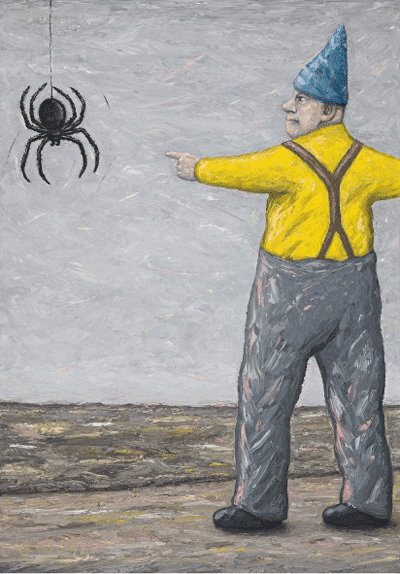Last time, we visited the Court of the fool king Theoria Rex, attended on one side by WC Chain and on the other by Laughing Lord Spider.

We do have an affection for such characters. King Canute, for instance.

click the image to enlarge
It was another dubbed royal, Nat 'King' Cole, who popularised the wisdom of 'Nature Boy'. There was a boy
A very strange enchanted boy
They say he wandered very far
Very far, over land and sea
A little shy and sad of eye
But very wise was he
And then one day, a magic day
He passed my way, and while we spoke
Of many things, fools and kings
This he said to me
'The greatest thing you'll ever learn
Is just to love and be loved in return'

click on the image above to hear it sung by the one who wrote it, eden abhez :
George Alexander Aberle, known as eden ahbez (15 April 1908 – 4 March 1995), was an American songwriter and recording artist of the 1940s to 1960s, whose lifestyle in California was influential on the hippie movement. He was known to friends simply as ahbe.
Ahbez composed the song "Nature Boy," which became a No. 1 hit for eight weeks in 1948 for Nat "King" Cole and has since become a pop and jazz standard.
Living a bucolic life from at least the 1940s, he traveled in sandals and wore shoulder-length hair and beard, and white robes. He camped out below the first L in the Hollywood sign...
Hey, that's our kinda guy!
...above Los Angeles and studied Oriental mysticism. He slept outdoors with his family and ate vegetables, fruits, and nuts. He claimed to live on three dollars per week.
Ahbez was born in Brooklyn, New York, to a Jewish father and a Scottish-English mother, and spent his early years in the Brooklyn Hebrew Orphan Asylum of New York, which branched off from the Hebrew Orphan Asylum. He was then adopted, in 1917, by a family in Chanute, Kansas, and raised under the name George McGrew.
During the 1930s, McGrew lived in Kansas City, where he performed as a pianist and dance band leader. He probably also lived in New York City for some time, although little is known of that period of his life. In 1941, he arrived in Los Angeles and began playing piano in the Eutropheon, a small health food store and raw food restaurant on Laurel Canyon Boulevard. The cafe was owned by John and Vera Richter, German immigrants who followed a Naturmensch and Lebensreform philosophy influenced by the Wandervogel movement in Germany. He was a vegetarian. He recalled once telling a policeman: I look crazy but I'm not. And the funny thing is that other people don't look crazy but they are.
Their followers, known as "Nature Boys" and who included Robert "Gypsy Boots" Bootzin, wore long hair and beards and ate only raw fruits and vegetables. During this period, he adopted the name "eden ahbez," choosing to spell his name with lower-case letters, claiming that only the words God and Infinity were worthy of capitalization. He is also said to have desired the A and Z (alpha and omega), the beginning and the end, in his surname.
- wikipdeia
John Barbour (1954-2011) had his cast of wise fool characters too : John Barbour, John de Silentio, Joao Solitaire, the dunce...
photo : Karen Woodbury Gallery, Melbourne
detail
A Person Looks At A Work Of Art/
someone looks at something...
LOGOS/HA HA
A Person Looks At A Work Of Art/
someone looks at something...
LOGOS/HA HA





